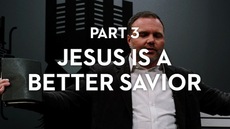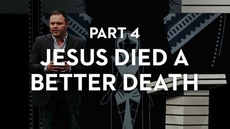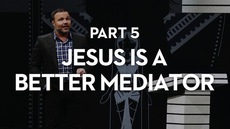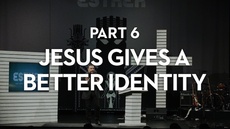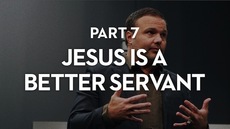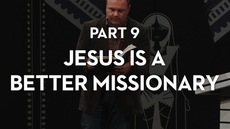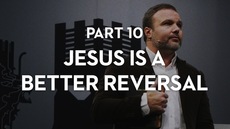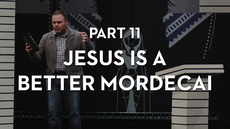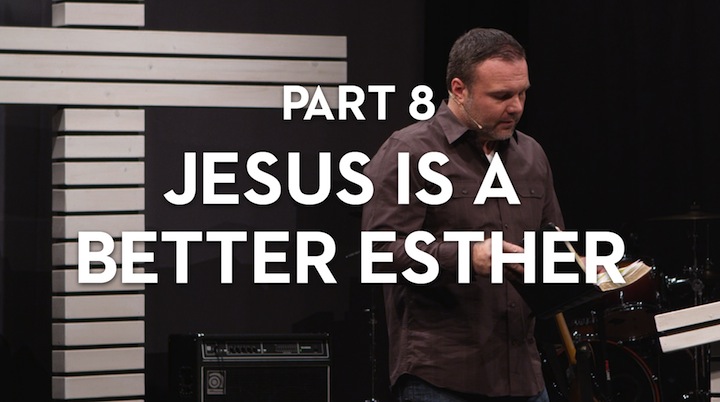
Can’t see the video? Download and install Flash to be able to view. Get Flash Here
Jesus is a better Esther who came into human history as one of God’s people. God’s people in the Persian Empire were spared death because Esther finally identified with them, but all of God’s people are spared eternal death because Jesus Christ identifies with us. We are all Haman; we will either hang on our own cross for our own sin like him, or Jesus hung on a cross in our place for our sin.
14 While they were yet talking with him, the king's eunuchs arrived and hurried to bring Haman to the feast that Esther had prepared.
7:1 So the king and Haman went in to feast with Queen Esther. 2 And on the second day, as they were drinking wine after the feast, the king again said to Esther, “What is your wish, Queen Esther? It shall be granted you. And what is your request? Even to the half of my kingdom, it shall be fulfilled.” 3 Then Queen Esther answered, “If I have found favor in your sight, O king, and if it please the king, let my life be granted me for my wish, and my people for my request. 4 For we have been sold, I and my people, to be destroyed, to be killed, and to be annihilated. If we had been sold merely as slaves, men and women, I would have been silent, for our affliction is not to be compared with the loss to the king.” 5 Then King Ahasuerus said to Queen Esther, “Who is he, and where is he, who has dared to do this?” 6 And Esther said, “A foe and enemy! This wicked Haman!” Then Haman was terrified before the king and the queen.
7 And the king arose in his wrath from the wine-drinking and went into the palace garden, but Haman stayed to beg for his life from Queen Esther, for he saw that harm was determined against him by the king. 8 And the king returned from the palace garden to the place where they were drinking wine, as Haman was falling on the couch where Esther was. And the king said, “Will he even assault the queen in my presence, in my own house?” As the word left the mouth of the king, they covered Haman's face. 9 Then Harbona, one of the eunuchs in attendance on the king, said, “Moreover, the gallows that Haman has prepared for Mordecai, whose word saved the king, is standing at Haman's house, fifty cubits high.” 10 And the king said, “Hang him on that.” So they hanged Haman on the gallows that he had prepared for Mordecai. Then the wrath of the king abated.
The Holy Bible, English Standard Version copyright © 2001 by Crossway Bibles, a publishing ministry of Good News Publishers. Used by permission. All rights reserved. Quotation information.
This is a crazy book. Amen? It’s a Mexican soap opera with Persian subtitles. It has it all. You’ve got powerful, rich, drunken men; beautiful women; corrupt politicians; and death on the horizon. Esther is amazing. We’re in Esther 6:14 through 7:10, looking at “Jesus Is a Better Esther.”
If you’re new, let me catch you up. There is King Xerxes, the drunken, powerful, crazy king of the Persian Empire. He deposed of his first wife, got a second wife. Her name is Esther. His right-hand man is a guy named Haman. Haman is a horrible human being. He is a horrible human being. He loves power, attention, fame, and glory. He wants everyone to bow down to him. He’s second in command for the entire Persian Empire, and a decree is sent forth that everyone should bow down to Haman.
And everybody does except one guy named Mordecai. Mordecai refuses to bow down, and Haman becomes so incensed, infuriated, enraged that he determines that he will kill Mordecai. Not only Mordecai, but all the Jewish people, all of God’s people, because they are somehow, in his mind, in perhaps, even in a minuscule way, connected to Mordecai.
So he goes to the great king and he basically pitches it as a revenue stream. “Let me commit genocide against all of God’s people, I’ll plunder all of their possessions, and I will give you a 50 percent increase in the tax base for this year by giving all of that income to you.” The king signs the decree, the date is set, mourning occurs. Death is on the horizon for all of God’s people.
Esther finds out about this, and lo and behold, she’s one of God’s people. She’s not been a necessarily faithful, godly, amazing woman her whole life. She’s been married to the king for four or five years, and no one knows, including her husband, that she is one of God’s people. This means that she has not been obeying the Scriptures.
She’s not been tithing, she’s not been undergoing public prayers and celebrating feasts, and festivals, and holidays. It means that she’s not been obeying the dietary laws of the Old Testament. It means that she’s not been meeting with God’s people, she’s not been worshiping with God’s people, she’s not been studying the Scriptures. Like some of you, she would profess a faith that she may not posses and she certainly doesn’t practice. And so no one knows that she’s Jewish, including her husband.
But now, a death sentence has been set for Mordecai, who, in the providence of God, happens to be her adoptive father, and all of God’s people, which means that she too is now in danger. So, at this dramatic point in the story, what is going to happen? Everything is sort of culminating to this moment, seeking some sort of resolution. And the first question is: will all of God’s people die? Alright, the date is set. The decree has been set forth. On this day, all these people will die.
So, we pick it up in Esther 6:14. “While they were yet talking with him, the king’s eunuchs arrived and hurried to bring Haman to the feast that Esther had prepared.” So, Esther, in hearing that the death sentence had been issued, she is now practicing faith in God. She’s growing in faith in God, she’s a maturing, growing young woman, acting in an increasingly godly way. So, if you have been hypocritical, if you’ve been compromised, it’s not too late for you. We see with Esther that God quickly blesses even simple obedience.
And she’s growing, and she’s maturing, and she’s decided that she needs to find a way to use the position of influence that God has appointed for her as queen to spare God’s people. So, she took a risk of her life. We saw in previous chapters, she went into the presence of the king, which could be a death sentence. You weren’t allowed to approach the king unless invited, but she risked her own life, saying, “If I perish, I perish.”
And the king welcomed her and asked her, “What is it that you would want?” And she’s wise, not foolish. She’s patient, not impatient. She’s waiting for the right opportunity to reveal her Jewish identity and make her request known to spare God’s people. So, she throws a banquet, and she invites the king and Haman, her enemy. Keep your friends close and your enemies closer. And over the course of the night, the king asks, “What could I do for you?” And she says, “Attend another party.” She realizes it’s not yet time, so she throws another banquet.
Well, at this banquet, again, here is Haman, and here is the king. And the plot thickens, and the tension rises, and with every minute, God’s people are closer to death. And her adoptive father is on the brink of being crucified, impaled on a seventy-five-foot-high cross that Haman has built in his own yard to make a public spectacle of the one man who would not bow down to his glory, yet Esther’s patient. The Bible says in 1 Peter that God is not slow, but that he is patient. Esther here is not moving slow, she is patient.
“So the king and Haman went in to feast with Queen Esther.” Lots of parties in this book. And the feasts are occasions for transitions in the story. So much happens in the feasts and the meals, and here we are again.
“And on the second day, as they were drinking wine after the feast.” So, one thing you’ll notice in the book too: they drink a lot. Okay? Some of you say, “Drinking is not a sin.” Drinking a lot is a sin. We see over, and over, and over, “And then they made significant decisions after drinking a lot.” Might I submit to you, perhaps, possibly not the best plan. How many of you are smarter drunk? Okay, if you think you are, you’re still drunk. No one is smarter drunk. They drink and make decisions. So, they’ve had their party, and now the king and Haman, his right-hand man, they’re drinking heavily.
“And the king again said to Esther, ‘What is your wish?’” What do you want, Queen Esther? “It shall be granted you. And what is your request? Even to the half of my kingdom, it shall be fulfilled.” He keeps asking her. “You said you wanted something. What do you want? What do you want?” She’s waited patiently.
“Then Queen Esther answered.” And I want you to see how respectful she is. Yes or no, her husband is respectable? No. No. Yes or no, Esther is respectful? Yes. The Bible’s going to talk a lot about wives respecting their husbands. Men, we can always gives our wives a shortcut by being respectable, but here, she’s going to respect a man who is not respectable. And God encourages wives to conduct themselves in this way, not so that they will be without power, but so they will be with power.
If she were to disrespect her husband, we’ve already seen what happens. The first queen, Vashti, was deposed for being disrespectful toward her husband. And so Esther, here, in being respectful, is not allowing herself to become the issue, but the issue to remain the issue, and she is limiting the ability of the king to be offended by her, and she’s encouraging him to do the right thing by herself setting a godly example of being respectful.
What’s true of wives in particular, it’s true for everyone in general, any authority that you’re under: a boss, a coach, a pastor, a leader, a parent: respect. You say, “They’re not respectable.” Sometimes people are not, sometimes we’re not, but being respectful allows your voice to be heard in a way that is hopeful for the kind of change you’re seeking to effect.
And I want you to hear her respectful tone. “Then Queen Esther answered, ‘If I have found favor in your sight, O king, and if it please the king, let my life be granted me for my wish, and my people for my request.’” What she says is, “Here’s what I want: I want to not be murdered.” Do you think he didn’t see this coming? How many of you think that he was anticipating she wants some sort of lavish gift, nice holiday.
“What do you want?” “I don’t want to be murdered.” She’s very bold, right? Up until this point, she’s been timid. Now she’s bold. She’s been silent, now she’s speaking. She’s been passive, now she’s active. This is a woman growing in faith, and faith is demonstrated in courageous, truthful action. She’s demonstrating faith.
She goes on to say, “For we have been sold, I and my people,” that’s important, “to be destroyed, to be killed, and to be annihilated.” He’s had a few drinks. She’s going to make sure he doesn’t miss the big idea. Destroyed, killed, annihilated.
“If we had been sold merely as slaves, men and women, I would have been silent, for our affliction is not to be compared with the loss to the king.” That’s a big statement. “I wouldn’t trouble you with something as minor as the enslavement of an entire race, but this is a big deal.” She sets the stage. “King, we hate to inconvenience you. We know you’re very busy. I would not bring trivial matters to your attention.”
Do you do this to those in authority over you? Do you only bring those things that are truly important and urgent? If so, you’re likely to be heard, but if you’re bringing everything and things that are truly nothing, then you’re being disrespectful and you will not be heard.
Esther is not a woman who’s made a lot of requests, and she even presents her request as: “It is very, very important. It’s actually more important than a whole people group being enslaved.” She’s got the king’s attention. She has our attention. What could be a more pronounced crisis than the enslavement of an entire people?
And let me say, this is, to this moment, the most important moment of Esther’s life. You need to know this: not every day is equally important. Not every moment is equally important. Not every opportunity is equally important. There must be times where the Holy Spirit gives us discernment that it is an urgent matter, that this is a one occasion that cannot be missed. These are sacred windows in life. That is, they pass by. If we miss them, they’re gone forever.
Sometimes among God’s people, there’s no sense of timing, there’s no sense of urgency, and it’s often because we’re absolutely, continually, selfishly consumed with our own affairs. Esther’s eyes are up, not in. She’s not looking at the chance that she might die, that she might suffer, she’s looking at the fate of others and the urgent situation that is set before them.
There are days when you will make a decision that alters the course of your whole life, and the more authority and power you have, it will affect everyone who is under your authority: parents, spouses, pastors, business leaders, ministry leaders, teachers. Keep your eyes open, keep your heart affixed toward the needs of others, and don’t be a coward and miss the opportunities to make a difference that God gives you.
And some of you say, “I don’t know if I’ll ever have an opportunity as Esther did.” None of us will, but God will give us our providentially appointed opportunities to love, serve, make a difference for others, and if we’re self-consumed with our own interests, we’ll overlook the interests of others. Esther, here, is a magnificent example by the grace of God, and she’s not always been a magnificent example, so there’s hope for those of us who have much to learn and grow. What’s she going to do? What’s she going to say?
“Then King Ahasuerus,” that’s his Persian name, his Greek name is Xerxes, “said to Queen Esther, ‘Who is he, and where is he, who has dared to do this?’“ The king is angry, because an assault on the queen is an assault on the king. It’s not that he particularly loves his wife. We’ve read previously that though they lived in the same palace, they would be separated sometimes for upwards of thirty days. She wouldn’t even see him. He was busy with a harem.
And Herodotus, the Greek historian, says that he spent most of the end of his life not consumed with the affairs of state but with the affairs of the harem. He doesn’t love his wife, he doesn’t cherish his wife, he’s not trying to protect his wife, but his wife is an extension of his kingship and someone who would plot against her is undermining him, and so it’s back to his pride, and his dignity, and his image, and his self-interest.
“Who did this? Where are they?” “And Esther said, ‘A foe and enemy! This wicked Haman!’” She’s pointing the finger. He’s standing right there. Bad day to be Haman, right? You thought you were going to dinner with the king and the queen. Put it on Twitter. “Going to dinner with the king and the queen again. I will post photos on Instagram later. Stay tuned.” He shows up. “What? Someone’s trying to kill the queen? Who? Me? Ugh.” He didn’t know she was Jewish.
Now, this tells you the king doesn’t know his wife very well either, right? Like, let’s say you’ve been married five years, your wife wakes up, you’re like, “What are you doing honey?” “I’m cooking dinner.” “What are we having?” “We’re having Asian food.” “Why?” “I’m Asian.” “You’re Asian? I did not—when did you become Asian?” “I’ve always been Asian. You’ve been here five years.”
Not the most attentive husband, right? They’ve not had a lot of deep conversations like, “Who’s your God?” Now, he probably is Zoroastrian. It’s an ancient, pagan religion. That means she’s probably been involved in what we call sorcery, and witchcraft, and divination, and they had soothsayers and all kinds of occultic things that happened in the Persian Empire.
And he’s never asked, “Who’s your God?” And she’s never said who her God is. She’s like some of us. She wants a private relationship with God, not a public relationship with God. She wants all the benefits and none of the obligations and suffering.
Now, here’s what she does. She comes out of the proverbial closet. Haman wants to kill all of God’s people. She raises her hand and says, “Where’s the list of all the names of God’s people who are to be killed?” And with this statement, she essentially takes the pen in her hand and walks up and writes her name on the list and adds it to the death sentence. She’s finally identified herself with God’s people.
Have you done that? Have you done that? See, there’s this ridiculous nonsense that all you need is a personal relationship with Jesus. Good luck finding it in the Book. I’ve read the whole thing a few times; I can’t find it. You do need to have a relationship with Jesus that is personal, but not solely personal.
It’s like a kid who gets adopted into a family. They need a relationship with their dad and all the other kids in the family. That’s what it means to be part of the family. You can’t just have dad and no brothers or sisters. It doesn’t work like that. Adoption by the Father is adoption into the family.
Some of you are like that. You’re like, “I don’t want to be part of a church. I don’t want to be in community. I don’t want to be under authority. Just me and Jesus.” The Bible knows nothing of that. It has God’s people, and Esther here is identifying herself with God’s people. An attack on God’s people is an attack on you. A criticism of God’s people is a criticism of you.
And that’s exactly what Esther demonstrates. She could have kept a personal relationship with God, just walked away from the entire crisis. “Oh, they’re going to die? No one knows I’m one of them. I’ll have a personal relationship with God, not a public relationship with God, and then I won’t have to suffer, and I won’t have to be ridiculed, and I will not have to murdered.” It’s a great privilege and honor to be one of God’s people, and I would encourage you not to be yet another selfish, modern, individualistic, consumer Christian who really doesn’t care about God’s people and just uses them for convenience and then criticizes them when services are not conducted and goods are not provided.
And I would ask you to not live in that way but to live as Esther does. She has nothing to gain by identifying herself with God’s people. There’s no reward, there’s no benefit for adding your name to the list of those to be murdered. She’s just counting it a great privilege to be numbered among God’s people, part of God’s family, associated in community.
Three things I want you to see in her noble, brave, godly action. Number one, I want you to see that divine sovereignty and human responsibility work together. There are basically two perspectives theologically. One emphasizes God’s sovereignty. “God’s in charge, God’s in control, God works it out, God takes care of it, God’s in the details, he’s got it all handled.” Others will go to other parts of the Scripture and say, “You need to speak, you need to give, you need to serve, you need to try, you need to help, you need to care, you’ve got to do your part.”
And the truth is it’s like two pedals on a bike. You do your part, God’s certainly going to do his part. You give what he’s asked you to give, he’s going to ask everybody else to give. He’ll make up the difference. You show up, that’s okay, God’s already going to be there. God is at work in the story of Esther, and part of his work is through Esther. She’s working with God.
Number two, God gives power to his people so that they might serve those who are powerless. See, in this situation, God’s people are powerless. It’s a monarch, it’s a king. It’s not a democracy. This is a dictatorship. They don’t get to vote for their elected officials. They don’t get to write ballot measures and appeal for their laws. They have no power.
Esther does. She’s the one person in the community of God’s people that has access to the king, can speak to the king, and, as the queen, has any power, and she uses it, not like Haman to indulge herself, but she uses it in such a way to speak up for those that have no voice and to give power to those who are powerless.
Some of you are very powerful. Some of you will increase in power. Some of you are teachers, and professors, and artists with great influence. Some of you are politicians with great influence. Some of you are business leaders with great influence. God does not put us, including those of us who are spiritual leaders, in positions of power for any reason other than to give a voice to the voiceless and to represent those who have no representation. This is why we care about people that are even not yet born. They would speak but they don’t have a voice yet, and they would vote but they can’t get out of the womb.
Number three, care for God’s people first. Yes, we want to love the whole city, and serve the whole city, and do good for all people because they’re made in the image and likeness of God and they’re loved by God. All true, but God’s people first. It’s like a family. You love the neighbors, but you’ve got to feed your kids first. You love the neighbors, but you’ve got to tend to your family first, then them. Not either/or, both/and, but your family first, their family next.
And what can happen is sometimes, with Christians, we get so excited about other people and other things that we’re looking over the people and things right in front of us. There could be a single mom or a kid without a dad sitting in front of you while you’re overlooking them for an opportunity to do good. It says in Galatians 6:10, “To do good for all people, especially those in the household of faith.”
That’s what Esther does. She’s the queen of Persia, she cares about all the people that live in her nation, but she is particularly concerned about God’s people first. Who’s going to protect them? Who’s going to serve them? Who’s going to represent them? Who’s going to fight for them? Do you care about God’s people? Are you overlooking them? Begin with God’s people.
The next question is: Will Haman die? Esther 7:6–7. “Then Haman was,” what? “Terrified.” Imagine you’re Haman. You’re the second most powerful man in the most powerful nation on the earth. You could make a case he’s the second most powerful man on the earth. He was going to kill an entire population. He just found out that that includes the queen. He’s terrified.
Have you been there? Have you been there? Your sin, your pride, your folly. Don’t blame them. It’s you. You’ve gotten yourself into a situation where you’re terrified. “I don’t know how to fix it, I don’t know how to get out of it. I’m terrified.” You been there? You’re obsessed about it. You’re thinking about it. You can’t sleep at night. You’re frustrated, you’re overwhelmed, you’re panicked. People can see it on your face. “What’s going on?” You don’t even know what to say. “I don’t even want to talk about it. The more I talk about it the more terrified I get, because as I hear myself explain it, I realize how doomed I am by what I’ve done.” He’s terrified.
“He was terrified before the king and the queen.” You could see it on his face. “And the king arose in his,” what? “Wrath.” A king who is sinned against has the right to respond with wrath. That’s anger, justice, consequence.
Be careful. Be careful you don’t take an attribute of God and turn it into God. God is love, and God is wrath. The wrath of God is spoken of more than the love of God. The wrath of God is spoken of more than six hundred times in various ways in your Bible. The wrath of God is real.
Here’s a picture of a king who has wrath against an enemy. Our God, the Lord Jesus Christ, is a king and he has wrath against his enemies. And we’re his enemies. We’re all Haman. We’re selfish, we’re proud, we’re in it for ourselves. And the king has wrath that burns against his enemies. Now, this king is not a perfect king. He does not have a perfect wrath. He will not enact a perfect justice. King Jesus is a perfect King, with a perfect wrath, who enacts a perfect justice on his enemies. You should be terrified before that King. Terrified!
Some of you don’t want to hear this, but you need to hear this. You live in an age in which you are told you are basically a good person, God is only love, there is no wrath, he has no enemies. That’s not true. That’s not true. It doesn’t end well for Haman. It doesn’t end, “And he lived happily ever after, and he had a change of heart, and all went well.” And for some of you, that is your fate at this moment. It’s not going to end well for you. You should know that you will be standing in the presence of a great King, and he will have a perfect wrath, and you should be terrified.
And I could just hear the objection, “I don’t believe in hell.” Dear friend, you will. You will. And for some of you, you feel no sense of urgency because you life is, frankly, going quite well. Haman’s was going quite well until the day before. The second most powerful man on the earth, rich, famous, bowed down to by the multitudes, access to the king, given full right to make legal decisions, and even take human life. We’ve even learned that he has friends, which is a miracle, and a wife who talks to him. His life is going very well.
And then one day, it flips upside down. Chapter 6 and 7 are two of the most ironic, surprising, shocking chapters of the whole Bible. And for some of you, your life is like that. Everything will be fine until you’re in the presence of the King, and his wrath burns against you, and you are filled with terror.
“And the king arose in his wrath from the wine-drinking.” Again, his justice, his wrath, his sentencing is not altogether perfect like the Lord Jesus’ will be. “And he went into the palace garden, but Haman stayed to beg for his life from Queen Esther, for he saw that harm was determined against him by the king.” He could see it on the king’s face.
“Who is the man that wanted to destroy my wife?” “It’s that man.” The king didn’t say a word to Haman, he looked at him, and Haman saw a furious wrath in the eyes of the king and he realized he was a dead man. So, the king goes out to the garden to collect his thoughts. “What am I going to do? I’ve got my wife, the queen, my right-hand man. I’m the one who signed the decree to kill the people and I didn’t know that my wife was numbered among them.”
See, Xerxes’ sin has gotten him into a very difficult situation as well. Esther is probably very concerned. Perhaps she will be divorced and deposed like Vashti was earlier in the book because she has complicated the king’s life. Maybe she will be sentenced to death. Perhaps the king could become angry and say, “You did not tell me who your God was. You did not tell me who your religion was. I don’t even know who you are. You tricked me, you fooled me, you lied to me, and so you too shall die.” What’s going to happen to her? She doesn’t know.
And Haman is terrified. And Haman arrived at this place because he was furious that one man would not bow down to him and fall at his feet, and in great reversal of irony, he throws himself at the feet of one of God’s people. Not just that, a woman, which in that culture would have been highly unusual. The proud Haman is now at the feet of one of God’s women. What’s the king going to do?
We then read that Haman is killed. Before we read, some Sundays you come to church, it feels like a wedding. It’s amazing. God showed up, people were saved, let’s all celebrate. Some days you show up, it feels like a funeral. Somebody died. Today is Haman’s funeral. A few thousand years later, we’re revisiting his death: why he died and how he died. This is a funeral.
Chapter 7, verse 8: “And the king returned from the palace garden to the place where they were drinking wine,” still drinking, “as Haman was falling on the couch where Esther was. And the king said, ‘Will he even assault the queen in my presence, in my own house?’”
Now, here’s what happens. He walks in, Queen Esther’s on the couch, Haman throws himself at her feet, and the king declares, “He’s trying to assault my wife.” Do you think that’s true? Do you think at that moment, Haman is thinking, “Romance. This is a good point to seduce the king’s wife and start a romantic relationship. This seems like the perfect time.” No.
Now, the rule was if you’re the queen and you sit on a couch, you get the whole couch. Right? And other men weren’t supposed to, “Hey, could you scoot over?” Still a good rule. Alright? For my wife, same rule. Whatever. You know, it’s a good rule. Esther’s sitting on the couch. A man is not supposed to be near a woman he’s not married to, especially the queen. The only men who are allowed near the queen are the eunuchs, and here’s Haman begging for his life.
Now, this king is not like our King. This king, he reinterprets the facts, he rewrites history. What he says is, “Oh, sexual assault. I was wondering how I could kill Haman because he asked for the permission to kill God’s people, and I wrote the edict, so it’s blood on my hands. I’m trying to figure out how to wipe that blood on Haman. I found a way. He was trying to sexually assault the queen. Now I can kill him and I have a reason.” Is that true? No.
Here’s what’s ironic: Haman lied about God’s people so that he could kill them, and now his great king is going to lie about him so that he can kill him. It’s a horrible thing that the king is doing. We do it too, right? How many of us have gotten ourselves—or, I shouldn’t say it that way. All of us have got ourselves into positions where we’re guilty. The situation that we find ourselves in is totally of our own doing, our own sin, our own pride, our own folly, and rather than repent—and see, they actually had no repentance. This is a culture built on unrepentance. They had something called the Law of the Medes and the Persians, meaning when the king makes a decree, it’s irreversible. What that means is the king can never say, “I’m wrong.”
Some of us live like we’re kings and queens with the Law of the Medes and the Persians. “Well, I said it. I’m not going to go back on it. I’m doing it. I’m not going to back up. This is the way it’s going to be. I don’t care if it’s right or wrong. Proceed forward.” And then what happens is things become complicated, and difficult, and there’s a problem, because that’s what happens to unrepentance.
And what we do, then, is we reinterpret the facts and we rewrite history. Do you do this? I do. Okay, well they said this, and they did that, and if I could take that out of context, and combine it with this, and then suspect their motives, and retell the story, then all of a sudden they’re guilty and I’m innocent. And it happens. Right?
That’s exactly what the king does. “Well, let’s see. Haman used my authority and got my permission, but now it’s risked my wife, which threatens my glory, and he didn’t sexually assault her, but close enough. And I’m the king, so here’s what I’m going to do: I’m going to take certain facts and I’m going to put them together in a way that’s not entirely true, and then I’m going to retell the story and I’m going to call Haman a sexual assaulter, an evil-doing, horrific man who threw himself at the queen. I’m going to say it loud, I’m going to say it strong. Others will believe it, and I can kill him, and I can wipe all the blood on my hands on Haman.” We do it, you do it, I do it. When we’re unrepentant, we start rewriting history, and reinterpreting the data, and retelling the story so that it’s close to the truth, but it’s not.
“After the word left the mouth of the king, they covered Haman’s face.” You know, when someone is taken captive, or a prisoner in war, a hostage, we see it on the news. They cover their head. This happens to Haman. All Haman ever wanted was to see the face of his king, and they covered his face in shame and disgrace so that he could not see the face of his king.
It’s a glorious longing that Haman has and the wrong king. See, Jesus is our King. The Bible says in 1 Corinthians 13 that one day we shall see him face to face. The Reformers would talk about living coram deo, which means “in the face of God.” Friends, we are to live in the face of God. We are to know that set before us is the face of God who sees, and knows, and hears all that we say, and do, and are, and we’re living coram deo, in the face of God. And one day we will see Jesus face-to-face, and he will be smiling to welcome us or we will see furious wrath in the eyes of the King. We have to be living in the face of our King. Haman had a glorious idea and a horrendous king.
Who’s your king? Who do you live in the face of? Who do you want to be in the presence of? Who do you want to know? Who do you want to know you? Who do you long for the approval of? Who do you long for the friendship of? Who do you long for the provision of? That’s your king. Spouse, family, friend, coworker, neighbor, enemy, false god, a mirror, yourself. Who’s your king?
Let me tell you this: you’re going to die. Haman was not ready to die. Are you ready to die? As we look at the death of one man, we must remember the death of every man, because all have sinned, death comes for all. Every time you go to the fridge and you take food out and you check the expiration date, I want you to remember there’s a date set for you as well. You’re going to die. You don’t know when that day is, but you are living in the face of God, and when you die, you’ll be standing face-to-face with God.
“Then Harbona,” verse 9, “one of the eunuchs in attendance on the king, said—” Before we get to what he said, let me say this: his name is mentioned. All Scripture is God-breathed, profitable. God doesn’t waste a word. This man’s name is listed. Do you know why? Though he is only a bit character in this injustice and death sentence, he is nonetheless morally responsible in the face of God.
Some of you would look at the story and say, “I’m not a Haman.” Maybe you’re a Harbona. You didn’t come up with a bad plan, you didn’t create all the problems, but you’re there involved to some degree and you’re guilty for participating in injustice and evil. What’s he going to say?
“‘Moreover, the gallows that Haman has prepared for Mordecai, whose word saved the king, is standing at Haman’s house, fifty cubits high.’” Seventy-five feet, which was quite tall in that day. “And the king said, ‘Hang him on that.’ So they hanged Haman on the gallows that he had prepared for Mordecai. Then the wrath of the king abated.”
See, a king’s wrath requires a sacrifice. It requires death. It requires that blood be shed. This is just an unjust king, and Jesus is a perfectly just King, but that wrath of the king always needs to be abated and somebody has to get crucified. In this case, it’s Haman. He so longed to crucify Mordecai, he built a 75-foot-high impaling pole, which is the precursor to crucifixion, Roman style, that Jesus suffered. He had it built in his backyard so that when he would hang his enemy, it would be high so that others would see that he is a man to be bowed down to.
The day before, he finished making this cross, and he was anticipating the execution of one of God’s people. And in a horrendous day of transition, the worst day of Mordecai’s life, he is hung on his own cross, in his own yard, in front of his own family. He is bleeding, and weeping, and shrieking, and dying. And what’s worse is he closed his eyes and opened them to see another King with a deeper wrath and a more perfect justice.
One of my responsibilities in the face of God as your pastor is to prepare you for your day of death. Are you ready to die? Are you living in the face of God? Does the King’s wrath still burn against you? People don’t talk about sin, they don’t talk about death, they don’t talk about hell, but Jesus does more than anyone.
How are you feeling right now? What are you thinking right now? It reveals a lot about how you see sin and God, what you’re thinking and feeling in moments like this, disorienting, troubling, disturbing moments like this.
How many of you, you’re bothered by this? You’re thinking, “Haman is a man we don’t know much about. We don’t know about his upbringing. We don’t know about his family. Was he mistreated? Was he abused? Was he unloved? Did he have any medical, chemical, hormonal, biological problems? Was he suffering? What was his marriage like? What had people done to him? We just don’t know. Maybe if we had more psychological insight and information, we could interpret Haman in light of his circumstances. Yes, there’s a lot of darkness, but in him there must be some light. He’s probably a good person. He’s probably misunderstood. You know, whoever told the story was probably biased against him. This doesn’t seem like incredibly objective history. We just don’t know enough facts. I’m not sure he should have suffered this fate. I’m not sure this is sufficient. This seems too much, too dark, too intense, too harsh. I’m not sure I’m okay with this, and I certainly don’t like to hear that maybe God treats people like this. It bothers me.” Then you think that you’re not that sinful, and he’s not that holy, and your life isn’t that bad.
How many of you wrongly, really like this? “He got crucified in his yard? That’s awesome! That’s awesome! Oh that more would be crucified in their yard. Oh that all the bad guys, and all the evil-doers, and all those who wreak injustice and havoc would suffer that fate.” Even people who don’t believe that we’re sinners and that God is holy and hell is real, you say, “What about Adolf Hitler and what about child molesters?” They’re like, “That sounds good. Hell’s fine for them, but not everybody. Just the really bad guys. The really bad guys should get treated like this. They should be made a public spectacle of. They should suffer. They should bleed. They should die.”
How many of you, perhaps too much, are really glad that this is how it’s ended for Haman. You were even coming here today saying, “I know where we’re going. That’s why I’m here.” See, what happens is we love it when those evil people get it, but we’re not evil so we shouldn’t get it. We can see their sin more clearly than our own. We can see their guilt more than our own. We can cheer their justice more than our own. It’s called hypocrisy and self-righteousness, and it tends to be the preferred diet of those who are religious.
How many of you are just flat out confused and conflicted? You’re like, “I’m kind of feeling both. I think, well, it’s good that God’s people are spared, it’s good that Haman was dealt with, it’s good that they’re going to live, but being crucified in your yard in front of your family seems a bit much, so I’m conflicted. I’m glad for the results but I’m grieved by the process. I’m sitting on a little throne wondering what I would do if I was God, and I’m wondering if I would do a better job than God because I’m second-guessing what he has decreed to be done.”
In one day, two things happen: salvation and condemnation. In one day, Haman was condemned. Let me just tell you this, okay? I love you, I’m not glorying in this. Like Esther, I just want to tell you the truth. Haman didn’t get saved. We have no evidence of that. Haman didn’t repent. Haman never apologized to the God of the Bible and saw forgiveness. Haman never joined God’s people.
When you go to a funeral, here’s what happens: people, they mean well, but they don’t help. They say things like, “Well, I’m sure they went to be in a better place.” It’s rude to say, “No they didn’t,” but it’s true, because not everybody who dies automatically goes to a better place. Some people stand face-to-face with God who is a King whose wrath burns against them, and his wrath is only abated through justice meted out against them forever.
And let me say this: God punishes everyone in hell forever, the Bible says, “according to their deeds,” meaning the worse life you live, the more suffering you endure. It’s always punishment fits the crime.
And I just—I know some of you say, “Well, we don’t know. Maybe Haman got saved. Maybe everybody got saved. Maybe he lived in an eternal state for awhile and came to repentance, or maybe he ceased to exist,” or maybe Jesus isn’t a liar. And maybe right now, right now, when the Bible talks about weeping, and wailing, and gnashing of teeth, injustice under the wrath of God, that’s what Haman is experiencing right now, 2,000-plus years later.
Some of you are going to join him. Some of you are living in the path of the wrath of God and some of you don’t sense any urgency because, like Haman, your life has not flipped. It’s still working for you.
The reason Haman died, the reason Haman was condemned, was because he was a sinner and not identified as one of God’s people. So, in one day, there was condemnation because he was not one of God’s people, but there was salvation for all of God’s people. See, God doesn’t just save us individually. He wants, the Bible says, “a people for his own possession.” And they were saved because Esther, the ruler, identified herself with her people.
And this is all a portrait and a picture of the coming of Jesus, because Jesus is a better Esther. That the great King against whom we have sinned whose wrath burns against us, he gets off his throne, he comes into history as one of God’s people, the same race, the same group that Haman sought to destroy. And unlike Esther, he lives without any sin. Esther’s not a perfect savior. And he identifies himself with his people, and because of his identification with his people, all of God’s people are saved.
The story is amazing, but imagine this: imagine the moment where King Xerxes looked at Haman and said, “Take this man and crucify him now!” Imagine if in that moment, Esther walked over to Haman and said, “I forgive you and I love you, and King, I will take his place and I’ll be crucified for him, my enemy, so that he can become one of God’s people and take my place.” That would have been amazing. That’s what Jesus did. That’s why Jesus is a better Esther.
We’re Haman, and either we die for our sin or Jesus dies for it. Either the wrath of the King is abated through our punishment or the wrath of the King is abated through his punishment. See, the Lord Jesus identified himself with you and me and with us, and he did one thing that Esther did not do. He died not only for his people, but his enemies to make them his people.
Do you know Jesus? Do you love Jesus? Do you belong to Jesus? Are you living in the face of Jesus? Is Jesus your King? Did he die for your sin or will he punish you for your own?
Now, let me say this: every time I talk about hell, immediately people struggle with the thought of Jesus ruling hell. No one has trouble conceiving of Jesus ruling heaven; there’s always struggle hearing of Jesus ruling hell. Revelation 14:10, it says that they—and when it says they, it means some of you. Some of you will be tormented forever in the presence of the Lamb, Jesus. The one who died for our sin is also the one who punishes those who die without repenting of their sin, and that’s justice. Friends, you will either hang on your own cross for your own sin like Haman did, or Jesus hung on a cross in your place for your sin.
Let me close with this: Jesus is a better Esther. Xerxes went to a garden in preparation for rescuing God’s people by killing Haman; Jesus went to a garden and sweated blood in preparation to rescue God’s people by being killed by men like Haman. Haman was crucified for his sin, but Jesus was crucified for our sin. Haman gave God’s people no grace and endured wrath, but Jesus endured wrath for God’s people and gives us only grace. Haman hung on his cross, but Jesus hung on our cross. Esther saved God’s people spread across one nation in one generation, but Jesus saves God’s people from every nation in every generation. And God’s people were spared death because Esther identified with them, but God’s people are spared eternal death because Jesus Christ identifies with us.
Lord Jesus, you are a great King. You’re a perfect King, a much better King than Xerxes. You have truly been sinned against by everyone. We thank you, Lord Jesus, that though your wrath, and your justice, and your anger will deal with sin, that at the cross, you found a loving, humble, gracious way to also deal with our sin, with our treason, with our evil, with our injustice. Lord Jesus, as Esther identified herself with the people of God, we thank you for coming, Lord Jesus, to identify with us, the people of God. As her decision spared their lives, we thank you, Lord Jesus, that your decision for obedience spares our lives. Lord God, as we look at Haman, we realize we are like him. We are selfish, we are proud, we are bitter, we are vindictive, we are self-righteous, and we are enemies of you. And as he hangs on his cross, Lord God, we are reminded of the fate of all who are unrepentant, and we pray, Holy Spirit, that you would come now and grant the grace of repentance, that people who are your enemies would become your people, that Jesus would take their place, and that he would endure their wrath, and that they would take his place and enjoy his grace. Lord God, help us to read the Scriptures in a way that is gospel-centered, that is Jesus-focused, that is not just about morality and psychology, that is not making excuses for people so that we too might excuse ourselves. God, I pray for those who, right now, they know that they are living in the face of a great King. I pray that they would sense a right terror, that they would have a sense of urgency, that they would not wait until their life wasn’t working, because for some, it will work until they die and then it will not work forever. Lord Jesus, we thank you for being a better Esther. We thank you for dying on the cross in our place for our sins and rising as our Savior so that you can hear this prayer. Amen.
Note: This sermon transcript has been edited for readability.
